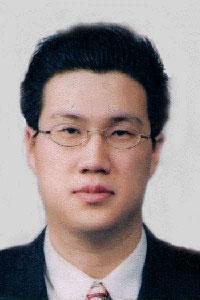非常抱歉,
你要访问的页面不存在,
非常抱歉,
你要访问的页面不存在,
非常抱歉,
你要访问的页面不存在,
验证码:

职称:Gordon McKay Professor of Electrical Engineering and Applied Physics
所属学校:Harvard University
所属院系:Electrical Engineering and Bioengineering
所属专业:Electrical and Electronics Engineering
联系方式:617) 496-9451
Donhee Ham, a 2011, 2012, 2013, and 2014 Harvard Yearbook Favorite Professor, is Gordon McKay Professor of Applied Physics and Electrical Engineering at Harvard University, where he has been with the Harvard Paulson School since September 2002. He earned a B.S. degree in physics from Seoul National University, South Korea, in 1996, where he graduated summa cum laude with the Valedictorian Prize as well as the Presidential Prize, ranked top 1st across the Natural Science College, and also with the Physics Gold Medal (sole winner). Following a year and a half of mandatory millitary service in the Republic of Korea Army, he went to Caltech for graduate training in physics. There he worked on general relativity and gravitational astrophysics under Professor Barry Barish, and later obtained a Ph.D. in electrical engineering in 2002 winning the Charles Wilts Prize awarded for the best thesis in Electrical Engineering. His doctoral work examined the statistical physics of electrical circuits. He was the recipient of the IBM Doctoral Fellowship, Li Ming Scholarship, IBM Faculty Partnership Award, IBM Research Design Challenge Award, and the fellow of the Korea Foundation of Advanced Studies. He shared Harvard's Hoopes prize with William Andress. He was recognized by MIT Technology Review as among the world's top 35 young innovators in 2008 (TR35), for his group's work on CMOS RF biomolecular sensor using nuclear spin resonance to pursue disease screening and medical diagnostics in a low-cost, hand-held platform. Donhee Ham's work experiences include Caltech-MIT Laser Interferometer Gravitational Wave Observatory (LIGO), IBM T. J. Watson Research, Consulting Visiting Professorship at Pohang University of Science and Technology (POSTECH), IEEE conference technical program committees including the IEEE International Solid-State Circuits Conference (ISSCC) and the IEEE Asian Solid-State Circuits Conference (ASSCC), advisory board for the IEEE International Symposium on Circuits & Systems (ISCAS), international advisory board for the Institute for Nanodevice and Biosystems, and various US, Korea, and Japan industry, government, & academic technical advisory positions on subjects including ultrafast electronics, science & technology at the nanoscale, and convergence of information technology and biotechnology. He served as a guest editor for the IEEE Journal of Solid-State Circuits (JSSC; Jan 2009 special issue) and was a co-editor of CMOS Biotechnology with Springer (2007). He is an associate editor for the IEEE Transactions on Biomedical Circuits and Systems. He is also serving as a guest editor for the IEEE Transactions on Biomedical Circuits and Systems in 2011. The intellectual focus of Donhee Ham's current research is on: (1) solid-state and biological systems interface; (2) plasmonic circuits using interacting electrons in low dimension. More details can be found at his research web. At Harvard University, he works with a group of talented students in electrical engineering, physics, and applied physics, who include absolute first rankers from top universities worldwide, US intercollegiate science competitions, and international science competitions.
Donhee Ham, a 2011, 2012, 2013, and 2014 Harvard Yearbook Favorite Professor, is Gordon McKay Professor of Applied Physics and Electrical Engineering at Harvard University, where he has been with the Harvard Paulson School since September 2002. He earned a B.S. degree in physics from Seoul National University, South Korea, in 1996, where he graduated summa cum laude with the Valedictorian Prize as well as the Presidential Prize, ranked top 1st across the Natural Science College, and also with the Physics Gold Medal (sole winner). Following a year and a half of mandatory millitary service in the Republic of Korea Army, he went to Caltech for graduate training in physics. There he worked on general relativity and gravitational astrophysics under Professor Barry Barish, and later obtained a Ph.D. in electrical engineering in 2002 winning the Charles Wilts Prize awarded for the best thesis in Electrical Engineering. His doctoral work examined the statistical physics of electrical circuits. He was the recipient of the IBM Doctoral Fellowship, Li Ming Scholarship, IBM Faculty Partnership Award, IBM Research Design Challenge Award, and the fellow of the Korea Foundation of Advanced Studies. He shared Harvard's Hoopes prize with William Andress. He was recognized by MIT Technology Review as among the world's top 35 young innovators in 2008 (TR35), for his group's work on CMOS RF biomolecular sensor using nuclear spin resonance to pursue disease screening and medical diagnostics in a low-cost, hand-held platform. Donhee Ham's work experiences include Caltech-MIT Laser Interferometer Gravitational Wave Observatory (LIGO), IBM T. J. Watson Research, Consulting Visiting Professorship at Pohang University of Science and Technology (POSTECH), IEEE conference technical program committees including the IEEE International Solid-State Circuits Conference (ISSCC) and the IEEE Asian Solid-State Circuits Conference (ASSCC), advisory board for the IEEE International Symposium on Circuits & Systems (ISCAS), international advisory board for the Institute for Nanodevice and Biosystems, and various US, Korea, and Japan industry, government, & academic technical advisory positions on subjects including ultrafast electronics, science & technology at the nanoscale, and convergence of information technology and biotechnology. He served as a guest editor for the IEEE Journal of Solid-State Circuits (JSSC; Jan 2009 special issue) and was a co-editor of CMOS Biotechnology with Springer (2007). He is an associate editor for the IEEE Transactions on Biomedical Circuits and Systems. He is also serving as a guest editor for the IEEE Transactions on Biomedical Circuits and Systems in 2011. The intellectual focus of Donhee Ham's current research is on: (1) solid-state and biological systems interface; (2) plasmonic circuits using interacting electrons in low dimension. More details can be found at his research web. At Harvard University, he works with a group of talented students in electrical engineering, physics, and applied physics, who include absolute first rankers from top universities worldwide, US intercollegiate science competitions, and international science competitions.